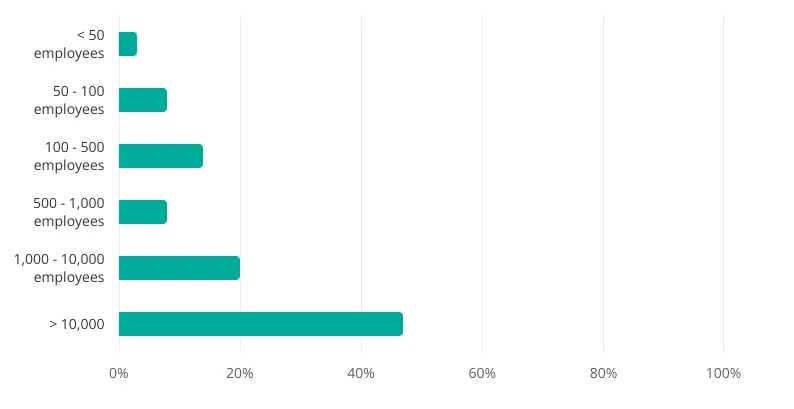The amount of data that organizations collect is increasing.
As such, the demand for data architects—those who design and develop data models, databases, and data warehouses—is also expanding. And the good news is that data architects’ salaries are also on the up!
In this post, we’ll explore what a data architect does, before looking at how much you can expect to earn as a data architect in 2023. We’ll also cover the basics of the data architect job market to see how in demand this role is. We’ll explore the following topics:
- What does a data architect do?
- Data architect salary by location
- Data architect salary by industry
- Are data architects in demand?
- How to become a data architect
- Summary
Recently qualified as a data analyst and ready to uncover your new earning potential? Then let’s dive in.
1. What does a data architect do?
Data architects are the backbone of any successful data-driven organization. It’s their job to review and analyze an organization’s data infrastructure and to design and develop new data systems and architectures.
This can include everything from simple databases to complex data warehouses and other data stores and pipelines. In short, any infrastructure organizations use to manage data collection, transformation, distribution, and consumption.
Understandably, this means data architects need a solid grasp of data analytics. But the role goes far beyond that. They also need an intimate understanding of an organization’s objectives so that they can create novel solutions. And on top of that, they need to be experts in database design and data engineering principles.
It can help to think of a data architect as similar to conventional architects. Only instead of designing buildings, they’re designing data systems!
How much experience do I need to become a data architect?
Just as a traditional architect requires years of training, the role of the data architect is not typically entry-level. However, becoming a data architect is still an achievable goal if you’re new to data analytics. With numerous routes for career progression, you will not be restricted if this is something you want to pursue.
What are a data architect’s responsibilities?
A data architect’s responsibilities will vary on a role-to-role basis, but they typically include the following:
- Designing, developing, and maintaining data warehouses, databases, data lakes, data pipelines, and other related systems
- Creating data models that meet business objects and processes
- Developing and implementing data governance policies, quality processes, security protocols, and access controls
- Integrating data from multiple sources into a unified architecture
- Implementing ETL (Extract, Transform, Load) processes
- Supporting data analysts and data scientists (among other roles) in their data-related tasks
- Ensuring that the data architectures they oversee are scalable, reliable, and secure
Next, let’s find out: how much can you earn on a data architect salary?
2. Data architect salary by location
In this section, we’ll explore how much data architects earn in different locations around the globe.
We’ve collated data from ten countries where data architects are in high demand, using estimates from the well-respected salary comparison website, Salary Expert. Launched in 2001, their estimates are based on 30 years of real-world data from the Economic Research Institute.
Since Salary Expert provides average salaries in local currencies, we’ve converted all figures into U.S. dollars for easier comparison. As you’ll know, currency conversions aren’t static, so be sure to click on each link in the following list to get the most up-to-date estimates.
Here’s our hand-picked top 10:
- Data architect salary in Switzerland: $134,000 (or 124,000 CHF)
- Data architect salary in the United States: $117,000
- Data architect salary in Australia: $105,000 (or AUD 152,000)
- Data architect salary in Germany: $101,000 (or €93,000)
- Data architect salary in Canada: $94,000 (or $126,000 CAD)
- Data architect salary in Singapore: $87,000 (or $117,000 SGD)
- Data architect salary in France: $88,000 (or €80,000)
- Data architect salary in the United Kingdom: $87,000 (or £68,000)
- Data architect salary in Sweden: $72,000 (or 732,000kr)
- Data architect salary in India: $25,000 (or ₹21,01,000)
As you can see, Switzerland, the U.S., and Australia offer some of the world’s most competitive data architect salaries. In general, data architect salaries in Europe are some of the best out there.
Are you thinking about relocating? Don’t forget to consider the cost of living in different countries. In real terms, a more modest salary might stretch further in countries with a lower cost of living if you compare that to higher data architect salaries in a country with a more expensive cost of living. Just something to keep in mind!
3. Data architect salary by industry
Okay, so let’s face it—you might not want to up sticks and move abroad! If you’re happier on your home turf, another essential factor to consider is the industry you’ll be working in.
While data architects are in demand across the board, the role is particularly sought after in particular sectors. It follows that these are the ones that tend to pay more.
The best source of data for data architect salaries by industry is, once again, the U.S. Bureau of Labor Statistics. While these data points are U.S.-centric, we can broadly extrapolate these findings to other developed countries, too.
According to the Bureau of Labor Statistics, the top 5 highest paying industries in the U.S. offer the following average annual salaries for data architects:
- Finance: $184,090
- Fashion: $177,000
- Electronic component manufacturing: $167,720
- Media and social media: $166,060
- Search engines and archives: $164,360
In addition to these industries, data architects see high levels of employment in sectors ranging from computer systems design to enterprise management, data services, insurance, and software publishing. These industries currently offer average annual salaries of well over $110,000 annually. This reflects the skill level required to fulfill this role, but it’s certainly something to aim for!
4. Are data architects in demand?
Yes! As organizations increasingly rely on data to inform decision-making, the demand for data architects is rising. In fact, according to the U.S. Bureau of Labor Statistics, the number of data architects in the U.S. is projected to grow by 8% by 2032—5% faster than the average for all other occupations.
Larger companies, in particular, are increasingly looking for talented data architects.
Check out this graph from the career expert, Zippia. Created using real jobs data, it shows the percentage of data architects that organizations of different sizes employ (on average).

5. How to become a data architect
Presuming you’ve arrived here as a newly qualified data analyst (or someone interested in the field), there are a few steps you’ll need to take to become a fully-fledged data architect.
We’ll level with you—you won’t become a data architect overnight—the role requires a high level of skill and experience. However, there are no prescribed career paths here. This offers greater flexibility in how to develop your skillset. It also means you have plenty of opportunities to gain the experience you need to carve a career in this rewarding and well-paid role.
So what steps should you take to go from novice data analyst to fully qualified data architect?
Obtain a certification
Professional certification is an important indicator of your skillset and experience. With the help of certifications, you can demonstrate your expertise in the core concepts of data architecture, such as data modeling and data engineering. You don’t have to commit to this immediately, but why not get started by researching the best free data analytics certifications online right now?
Gain work experience
More important than certification is having the right experience. If you’re starting out, look for internships or junior-level positions in data analytics roles. These will offer you an excellent overview of the field of data science more broadly, allowing you to start developing and honing the skills you need to become a data architect.
As you climb the career ladder, grab any opportunity to learn new data-related skills such as data mining, A.I., and cloud computing. These are all highly transferable skills that you will find helpful in your future career, even if you opt not to pursue data architecture later.
Consider getting a degree in a related field
While work experience is key, it’s also essential to continue learning new techniques and technologies to ensure you are up-to-date with the ever-changing world of data. While you can often do this on the job, another option is to get a formal qualification, such as a master’s or Ph.D. in a field like data science or data engineering.
While this is a big step and not something you should undertake lightly, if you have your heart set on data architecture as a career, it’s an option worth considering in the longer term.
Also, keep in mind that some (though not all) data architect roles require a higher level qualification as a prerequisite to applying. This comes with a cost attached, so you’ll only want to go down this route if you’re genuinely passionate about data science. But over the longer term, the investment will pay dividends in terms of your future earning potential.
Make professional connections
Networking is a great way to meet other data architects or to learn from those who have already achieved the success you’re aiming for.
Attend conferences, join webinars and online forums and start building connections with others in the data architecture world. Even if you’re relatively inexperienced, you may be surprised how many of these connections will come back to you in unexpected ways later in your career.
Play the long game
Finally, don’t expect to become a data architect overnight. It’s a long process that requires patience, dedication, and a commitment to learning. But invest the time and effort now, and the rewards will come later. With the right attitude, certifications, experience, and connections, your dream job will soon be within grasp!
6. Summary
As we’ve explored in this post, data architects can earn a pretty nice salary. And with demand for data architects only set to grow, salaries for skilled architects will only increase over time.
We’ve learned that:
- Data architects are responsible for designing, developing, and maintaining data warehouses, databases, data lakes, and other related systems.
- The demand for data architects is on the rise. And although salaries vary depending on location and industry, they are consistently higher than the average for other occupations.
- Switzerland, the U.S., and Australia offer the most competitive data architect salaries.
- The highest-paying industries for data architects are those related to information and communications, electronic component manufacturing, security and investments, finance, and computer manufacturing.
Keen to take the next step in your data analytics career? The first step is keeping up to date with the latest trends. Luckily, you can get started with this step right now!
Sign up for this free 5-day data analytics short course, or check out the following guides to read about the latest hot topics in data analytics:
